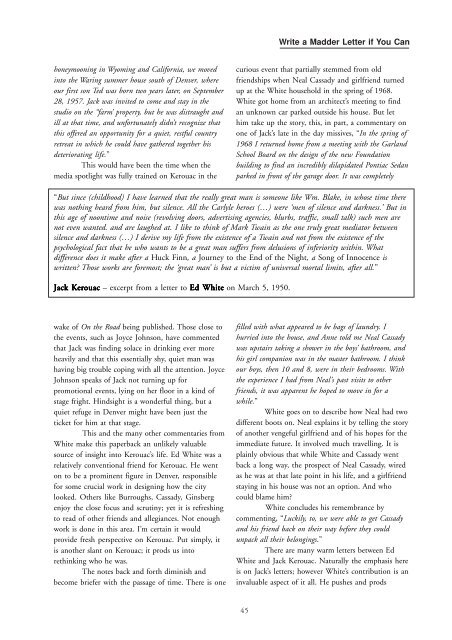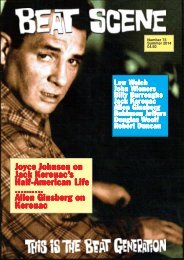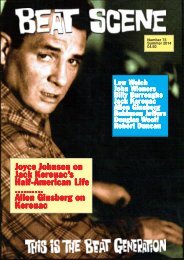Create successful ePaper yourself
Turn your PDF publications into a flip-book with our unique Google optimized e-Paper software.
Write a Madder Letter if You Can<br />
honeymooning in Wyoming and California, we moved<br />
into the Waring summer house south of Denver, where<br />
our first son Ted was born two years later, on September<br />
28, 1957. Jack was invited to come and stay in the<br />
studio on the “farm’ property, but he was distraught and<br />
ill at that time, and unfortunately didn’t recognize that<br />
this offered an opportunity for a quiet, restful country<br />
retreat in which he could have gathered together his<br />
deteriorating life.”<br />
This would have been the time when the<br />
media spotlight was fully trained on Kerouac in the<br />
curious event that partially stemmed from old<br />
friendships when Neal Cassady and girlfriend turned<br />
up at the White household in the spring of 1968.<br />
White got home from an architect’s meeting to find<br />
an unknown car parked outside his house. But let<br />
him take up the story, this, in part, a commentary on<br />
one of Jack’s late in the day missives, “In the spring of<br />
1968 I returned home from a meeting with the Garland<br />
School Board on the design of the new Foundation<br />
building to find an incredibly dilapidated Pontiac Sedan<br />
parked in front of the garage door. It was completely<br />
“But since (childhood) I have learned that the really great man is someone like Wm. Blake, in whose time there<br />
was nothing heard from him, but silence. All the Carlyle heroes (…) were ‘men of silence and darkness.’ But in<br />
this age of noontime and noise (revolving doors, advertising agencies, blurbs, traffic, small talk) such men are<br />
not even wanted. and are laughed at. I like to think of Mark Twain as the one truly great mediator between<br />
silence and darkness (…) I derive my life from the existence of a Twain and not from the existence of the<br />
psychological fact that he who wants to be a great man suffers from delusions of inferiority within. What<br />
difference does it make after a Huck Finn, a Journey to the End of the Night, a Song of Innocence is<br />
written? Those works are foremost; the ‘great man’ is but a victim of universal mortal limits, after all.”<br />
Jack Kerouac – excerpt from a letter to Ed White on March 5, 1950.<br />
wake of On the Road being published. Those close to<br />
the events, such as Joyce Johnson, have commented<br />
that Jack was finding solace in drinking ever more<br />
heavily and that this essentially shy, quiet man was<br />
having big trouble coping with all the attention. Joyce<br />
Johnson speaks of Jack not turning up for<br />
promotional events, lying on her floor in a kind of<br />
stage fright. Hindsight is a wonderful thing, but a<br />
quiet refuge in Denver might have been just the<br />
ticket for him at that stage.<br />
This and the many other commentaries from<br />
White make this paperback an unlikely valuable<br />
source of insight into Kerouac’s life. Ed White was a<br />
relatively conventional friend for Kerouac. He went<br />
on to be a prominent figure in Denver, responsible<br />
for some crucial work in designing how the city<br />
looked. Others like Burroughs, Cassady, Ginsberg<br />
enjoy the close focus and scrutiny; yet it is refreshing<br />
to read of other friends and allegiances. Not enough<br />
work is done in this area. I’m certain it would<br />
provide fresh perspective on Kerouac. Put simply, it<br />
is another slant on Kerouac; it prods us into<br />
rethinking who he was.<br />
The notes back and forth diminish and<br />
become briefer with the passage of time. There is one<br />
filled with what appeared to be bags of laundry. I<br />
hurried into the house, and Anne told me Neal Cassady<br />
was upstairs taking a shower in the boys’ bathroom, and<br />
his girl companion was in the master bathroom. I think<br />
our boys, then 10 and 8, were in their bedrooms. With<br />
the experience I had from Neal’s past visits to other<br />
friends, it was apparent he hoped to move in for a<br />
while.”<br />
White goes on to describe how Neal had two<br />
different boots on. Neal explains it by telling the story<br />
of another vengeful girlfriend and of his hopes for the<br />
immediate future. It involved much travelling. It is<br />
plainly obvious that while White and Cassady went<br />
back a long way, the prospect of Neal Cassady, wired<br />
as he was at that late point in his life, and a girlfriend<br />
staying in his house was not an option. And who<br />
could blame him?<br />
White concludes his remembrance by<br />
commenting, “Luckily, to, we were able to get Cassady<br />
and his friend back on their way before they could<br />
unpack all their belongings.”<br />
There are many warm letters between Ed<br />
White and Jack Kerouac. Naturally the emphasis here<br />
is on Jack’s letters; however White’s contribution is an<br />
invaluable aspect of it all. He pushes and prods<br />
45





